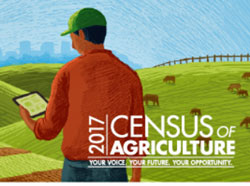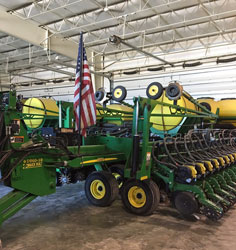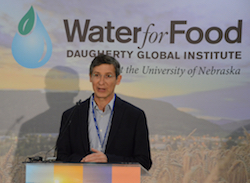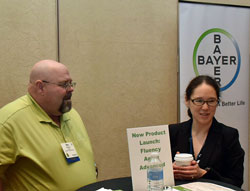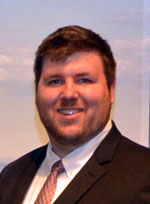 Mammoth Trading’s President, Richael Young sat on a panel during the 2017 Water for Food Global Conference called, “Drought, Water Risk and the Context for Water Markets.” Drought risk management was positioned as a focal point as panelists discussed the water transaction outlook, water policy trends and the role of public versus private investment in water markets.
Mammoth Trading’s President, Richael Young sat on a panel during the 2017 Water for Food Global Conference called, “Drought, Water Risk and the Context for Water Markets.” Drought risk management was positioned as a focal point as panelists discussed the water transaction outlook, water policy trends and the role of public versus private investment in water markets.
Mammoth Trading develops and operates market-based solutions to water resource challenges. Many places have active water markets but they are often decentralized and informal. Richael said they come in and help to reduce search and transaction costs for individuals.
“Mammoth Trading creates Smart Markets or electronic clearing houses that help automate the process of matching individuals who are interested in buying and selling water rights and automating the process of regulatory compliance,” Richael said.
There are a number of transactions people can make around water including: water leases, permanent transactions, pooling, rotational agreements, inter-annual water exchanges, etc. During the panel, Richael shared how farmers have been utilizing water markets over decades and how we are just shedding light on the extent of those occurrences.
“Water markets have emerged informally as a tool for farmers and communities to share water resources. If you can give communities the tools to move water resources to when and where they are needed, a wealth of risk management is provided,” Richael said.
The future of water rights was also discussed. Richael said more and more we are trending towards ways to give individuals the flexibility to use their water resources to best fit their needs. “We are also looking at ways to develop water markets that work well for communities. It’s not about taking water from one basin and exporting it to another. This is about how we can use water locally in a way that works best for that community,” Richael said.
Listen to my complete chat with Richael to learn more about the water market history, some misconceptions and more on the future: Interview with Richael Young, Mammoth Trading
View and download photos from the event here: 2017 Water for Food Global Conference Photos
 For the National Agri-Marketing Association, there’s a new app in town.
For the National Agri-Marketing Association, there’s a new app in town.

